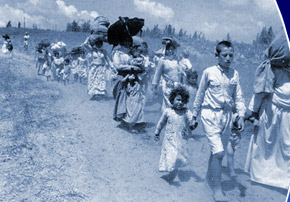






| According to the 1951 Geneva Convention relating to the Status of Refugees, a refugee is… [a person who]… owing to well-founded fear of being persecuted for reasons of race, religion, nationality, membership of a particular social group or political opinion, is outside the country of his nationality and is unable or, owing to such fear, is unwilling to avail himself of the protection of that country; or who, not having a nationality and being outside the country of his former habitual residence as a result of such events, is unable or, owing to such fear, is unwilling to return to it. |
|
|
Out of the 34.2 million refugees and Internally Displaced Persons (IDP's) in the world, approximately 15 million are Arab refugees and IDP's distributed among 19 of the 22 Arab states, the majority being of Palestinian, Iraqi, Sudanese, and Somali origins. Major refugee hosting countries in the region are Jordan, Lebanon, and Syria, and those home to large numbers of Internally Displaced Persons (IDP's) are Algeria, Palestine, Iraq, Sudan, and Somalia (1). RCRS examines and analyses the difficulties facing refugee communities in the Arab World and their impact on the socioeconomic, legal, and political conditions of both the refugees and the host countries. By highlighting the humanitarian conditions of refugees, RCRS aims to positively impact their livelihoods, to counteract the traditional image of the refugee as a burden, and to help societies perceive the refugee as an asset to host countries and as a major actor in socioeconomic development.
|
|
